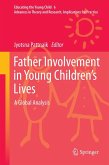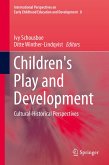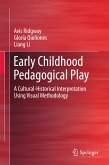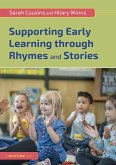The book provides a comprehensive analyses of Vygotsky's and Piaget's theories implementation in modern preschool education.It analyzes the problem of the relationship between the natural and the cultural in the context of Vygotsky and Jean Piaget theories. Their discourses complemented each other: whereas Vygotsky developed his theory in the direction from society (culture) to the individual child, Piaget's movement was the opposite: from individual child to society. These two approaches confront modern world with the need to analyze the problem of childhood: is childhood a period of cultural exploration or is it a special form of relationship in which both the egocentrism and consciousness of the child, and the egocentrism and consciousness of culture are represented?
Readers will gain insight into the methodology that makes possible to unite up-to-date views based on Vygotsky and Piaget theories on child development and education.
Dieser Download kann aus rechtlichen Gründen nur mit Rechnungsadresse in A, B, BG, CY, CZ, D, DK, EW, E, FIN, F, GR, HR, H, IRL, I, LT, L, LR, M, NL, PL, P, R, S, SLO, SK ausgeliefert werden.









